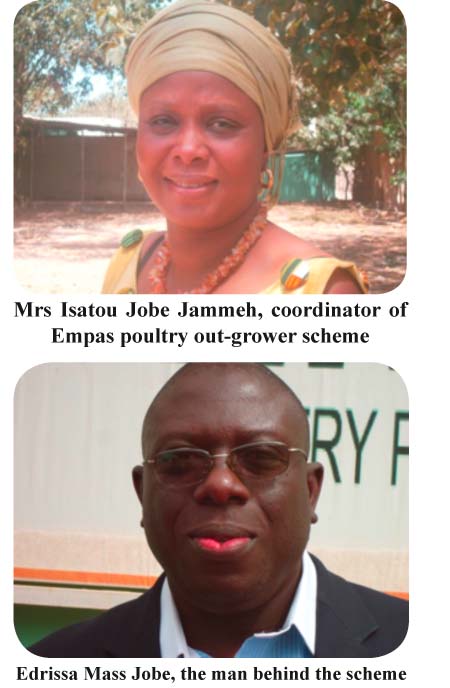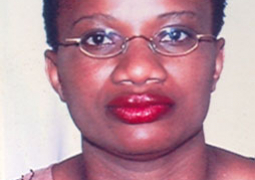
The coordinator of EMPAS out-grower scheme, Mrs Isatou Jobe Jammeh, has said the scheme’s target is to benefit 80 poultry out-growers within the diverse settlements across the regions of the country, depending on the selection criteria of the project.
She explained that the scheme is operating under the EMPAS Processing Company (Hatchery Farm at Farato).
Mrs Jobe Jammeh was speaking an interview with this reporter at her office in Farato at the EMPAS hatchery farm on Tuesday.
She said the scheme is a one-year project, which is in partnership with the Gambia Growth and Competitiveness Project (GGCP) funded through the World Bank.
According to her, the scheme started in January but the contract was signed on 4 December 2014 and its implementation would end in January 2016.
“The aim of this project is to establish an out-growers scheme that would support selected poultry farmers with day-old-chicks feed, vaccines and all the necessary poultry inputs, information and best practices for a profitable and sustainable poultry scheme,” the project coordinator said.
Mrs Jobe Jammeh further said most farmers were in the business of poultry, but due to the financial constraints, lack of adequate supply of day-old-chicks, lack of a proper hatchery and proper processing machine most of them had to go out of the business.
She said when this idea came up, the project started with those farmers who were already in the poultry production, and could not sustain their businesses, by giving them a package to continue their businesses.
Depending on the capacity of the farmer, the scheme would give the individual the number of day-old-chicks that they could hold and feed for the whole life cycle of the bird, she said.
She revealed that the scheme has set up criteria for selecting these farmers and the project is countrywide, and anyone who is qualified could apply.
“After the six weeks training, the farmer will be given the whole package to take home and rear your own bird; and at the end of the six weeks, the project management will come backto collect the mature bird, take it to our processing machine, which have a capacity of one thousand five hundred birds per hour,” she said.
She said the processing would be done and packaged, and then sold to the public, which would help the farmers, by resolving their marketing problems, to be more sustainable.
This would help the farmers to reduce the drudgery that they use to engage in, such as traveling all the way to Senegal or abroad to collect day-old-chicks, she added.
She disclosed that their hatchery in Farato farm have a capacity of one hundred thousand day-old-chicks per month, and the processing machine have a capacity of one thousand five hundred birds per hour.
There is a technical adviser working with the project, who could give technical advice and support to the people where necessary.
According to her, the first strategy of the project was to develop a center of excellence in all the regions, so that the satellite villages which are interested could go there to have support and collect their farm inputs.
According to her, the expectation before the end of the project is to meet the target, and to increase the income of the farmers by at least 30 per cent.
She urged all farmers who are interested in the project to do their level best, adding that it was a collective effort to make the project viable and sustainable, where all of them could benefit from it and would also help towards Vision 2016, which is to “grow what we eat” and “eat what we grow”.
She, however, highlighted some of their challenges, such as having the feed on time and the delivery and collection of the birds at the right time.
She challenged the farmers to take ownership of the project, which would help them to increase their income and benefit both parties.
She revealed that the Empas poultry out-grower team went on a trek countrywide to sensitize out-growers about the project, as most of them don’t know about the existence of the project.
Mrs Jobe Jammeh said the purpose of the trek was to brief the farmers about the aims and objectives of the project, the selection criteria used for applying to partake in the project, and also giving them the technical advice.
She
said plans are underway to start the secondary out-growers training scheme, as
the first one was for the center of excellence, adding that the secondary
out-growers training scheme is scheduled to take place on 10 June 2015, at
Jenoi in the Lower River Region.



